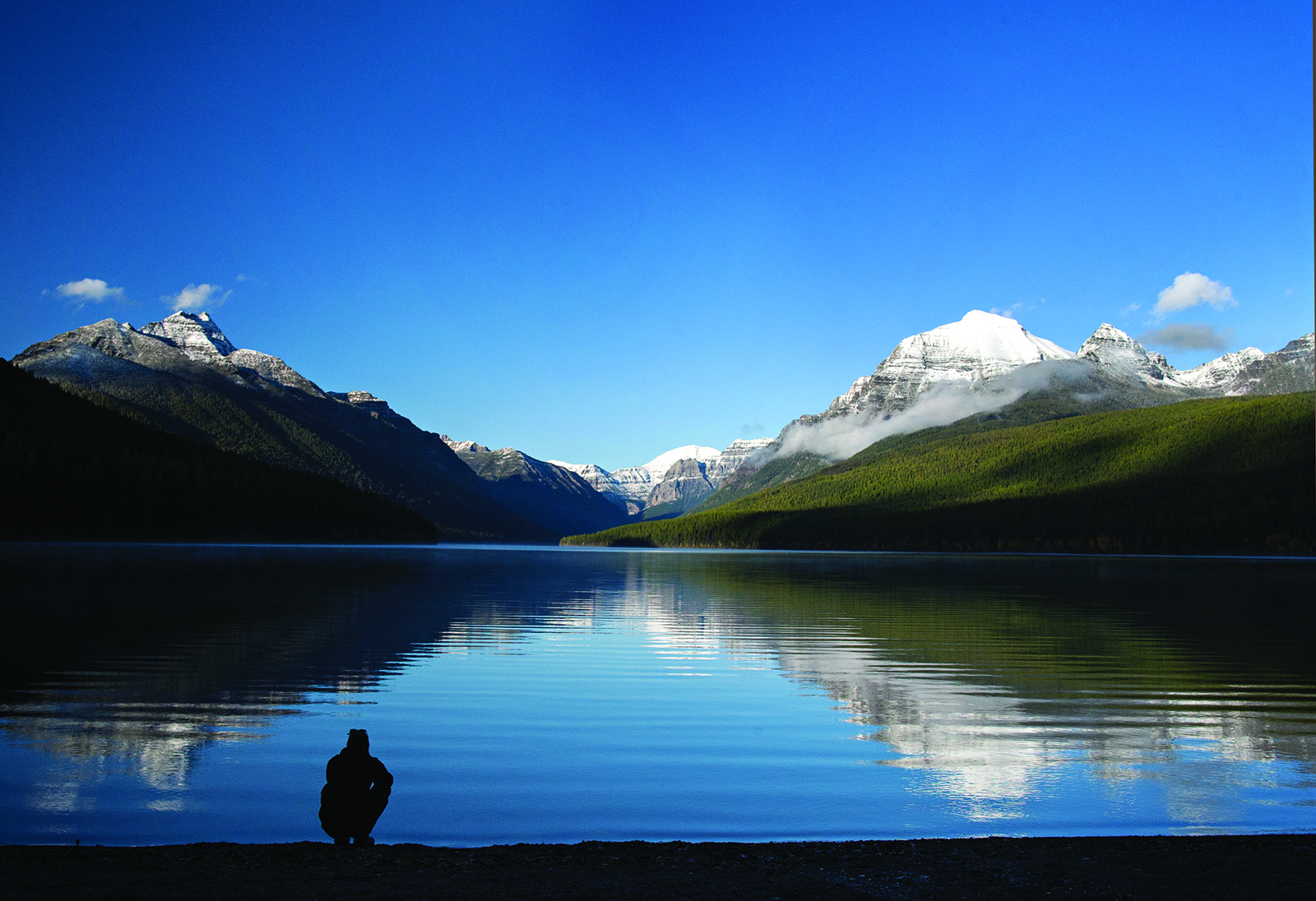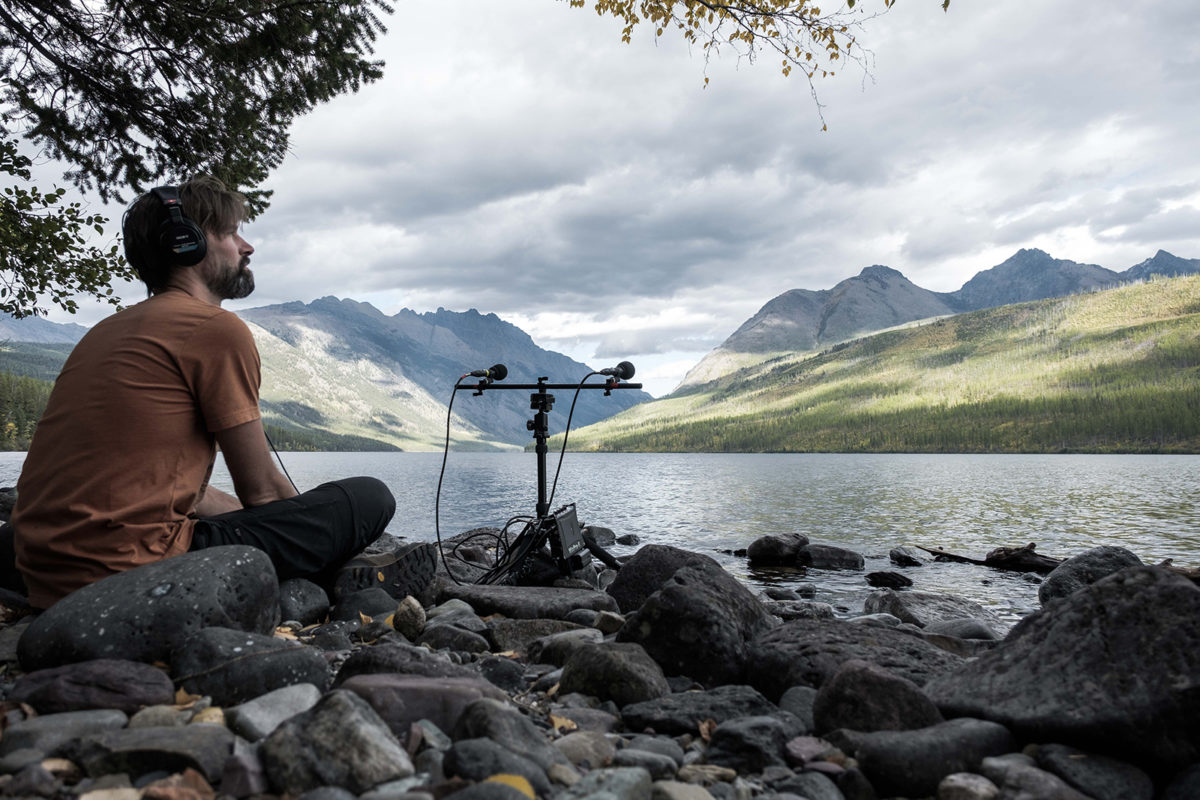
A Quiet Park
Following extensive soundscape testing, nonprofit Quiet Park International recognizes Glacier National Park as one of the best places in the world to hear natural sounds
In the spring of 2020, when the COVID-19 lockdowns kept millions of people around the world from venturing beyond their homes, scientists noticed a measurable phenomenon. The world was quiet.
“Talk about a silver lining. COVID came along and gave us its gift of worldwide quiet for a substantial period of time,” said Gordon Hempton, a sound recorder and acoustic ecologist who has dedicated more than three decades of his life to the idea of natural quiet. “So much quiet, such a reduction in human noise pollution, that seismologists even were able to listen to the earth with higher detail than ever before. Even regular people noticed the change.”
Hempton is the co-founder of Quiet Parks International (QPI), a nonprofit dedicated to promoting awareness of natural quiet (the term for ambient sound without human-caused intrusions) as a rapidly dwindling resource in the modern world. Hempton’s work with QPI came from his personal experience living on the Olympic Peninsula in Washington.
One day in the mid 1990s, Hempton was hiking in the Hoh Rain Forest, the heart of Olympic National Park, monitoring and recording the sound levels of the forest’s muted understory. Several miles down the trail he found what he believed to be one of the quietest places in the country. He placed a small red stone on a nearby tree trunk, calling it “One Square Inch of Silence (OSI),” and embarked on an effort to establish Olympic Park as the nation’s first Quiet Park. He figured if one square inch of space could be preserved for natural sound, the impact would radiate for miles.
Unfortunately, despite decades of advocacy work, little progress has been made on a legislative front, but QPI has begun to recognize quiet places on its own. In 2019, following extensive data collection, QPI determined that the Zabalo River in Ecuador met the gold standard for a Wilderness Quiet Park award.
In July, QPI announced its second Wilderness Quiet Park award to Glacier National Park (GNP). The award “reinforces the natural sounds educational efforts the park makes to distinguish the natural soundscape from noise, and the importance of the visitors’ opportunity for that experience.”
“As North America’s first wilderness quiet park, the hope is that a person would, on an average day, be able to have a quiet experience,” Hempton said. “What does that mean? It’s a feeling. An overriding feeling of calm, wonder, discovery and love.”
Glacier was nominated for the award by Mary T. McClelland, a local advocate for Glacier’s natural resources and founder of Friends for a Quiet! Glacier Coalition, a local group dedicated to reducing noise from human-caused travel in the park, particularly from air traffic.
“Glacier’s peacefulness and tranquility were cited among the characteristics that made it the world’s first International Peace Park,” McClelland said. “I grew up in Glacier and first heard the natural sounds of the park as a child. Being a voice for the Park and the natural sounds was a baton I took from many before me.”
McClelland’s father was a National Park Service (NPS) employee who worked in Glacier for decades. In a memoir, he wrote about the changes he observed over the years, saying “the natural quiet and solitude that characterized GNP when we first moved there in 1965 is gone, certainly in the summer months. This loss elicits a type of grieving for the lost possibility of quiet experiences.”
While McClelland acknowledges the changes that come with increased visitation, she still believes Glacier has maintained its unique wilderness character, in part because of the work park staff have done to preserve its natural resources.
“For anyone who says it isn’t quiet anymore, I say that it is up to us to do our part,” McClelland said. “This award specifically names individuals with the park who have worked for decades to preserve the park’s unique character and natural soundscape.”
Those individuals include Mary Riddle, recently retired Chief of Planning and Environmental Compliance; Richard Menicke, a geographer and Geographic Information Systems (GIS) coordinator within the park’s Division of Sciences and Resource Management; Brad Blickhan, the park’s Wilderness and Wild and Scenic River Coordinator; Deputy Superintendent Pete Webster; and former Superintendent Jeff Mow.
Both GNP and the NPS state on their websites the importance of soundscape management, adding that “any significant degradation of the natural sound environment deprives park visitors of the chance to connect with and appreciate the natural scene.”
Even so, GNP officials are firm in pointing out that they did not solicit QPI’s award, nor do they officially endorse the organization, instead deferring to McClelland’s work as a local advocate.
Karen Trevino, director of the NPS Division of Natural Sound and Night Skies, said that while the QPI award is “a nice thing for sure, I think it’s more of an accomplishment for the person who nominated Glacier and for Quiet Parks International — especially since it’s not really tied to any management actions.”
The NPS’ approach to preserving soundscapes contrasts with its proactive steps to protect the stunning visual elements of its locations, including light pollution. Glacier officials not only sought out the park’s newly minted status as an International Dark Sky Park, but they celebrated the designation.
Complicating the soundscape management, by contrast, is the jurisdictional overlap between Glacier National Park’s landscape and the skies above it. While a NPS unit might put policies in place to mitigate the intrusions of human-made sounds, those policies would only apply to the ground level. Meanwhile, the harshest human-caused noise intrusions come from jets and sightseeing helicopters overhead, all managed by the Federal Aviation Administration.
Indeed, it was aerial intrusions that started Hempton on his advocacy path in Olympic.
“The biggest complaint I got when talking about preserving quiet in Olympic was ‘why preserve something that will never be endangered,’” Hempton said. But just a few years after founding OSI, traffic into Seattle-Tacoma International Airport more than doubled and the U.S. Naval base on nearby Whidbey Island changed the training route of some fighter jets, sending them over the national park. The noise-free interval at OSI shrank from 5-6 hours to less than 15 minutes without an intrusion.

No matter where in the world you are, if you listen long enough, you will hear a jet passing overhead. Even in the heart of the Amazon, Nick McMahan, a sound recordist with QPI has recorded aerial intrusions.
As a field recorder, McMahan spent a week in Glacier last fall gathering data along the shores of Kintla Lake, one of the most remote access points in the northwest corner of the park.
The location was selected on the advice of McClelland, as well as the limited data that exists on Glacier’s soundscapes.
A 2004 study recorded noise levels in nine locations around the park, including Bowman Lake, in the North Fork area. Across the board, Bowman’s recording station showed the lowest levels of ambient sound and the longest intervals between human-caused noise.
Kintla Lake, located seven miles north of Bowman, is furnished with an additional degree of remoteness and, as such, seemed the ideal testing spot.
Over several days, McMahan recorded a natural noise level in the low 30-decibel range, roughly on par with a whisper. However, the hours of recordings are by no means quiet — wind, waves on the lakeshore and birdsong spiked the noise meter on a regular basis, as did human-caused sounds.
On one day, McMahan identified airplanes flying over head at 5:15 a.m., 9:02 a.m., 10:15 a.m., 11 a.m., noon, 1:15 p.m., 4:12 p.m., 5 p.m., 6 p.m., 7 p.m. and 7:30 p.m.
“At times I was a little surprised or annoyed by aircraft and vehicle noises. But compared to anywhere else there were just these large times of natural sounds,” McMahan said. “Until you’ve heard it, it’s hard to comprehend how special and rare that is.”
Tara Carolin, director of the Crown of the Continent Research Learning Center, said a person’s background greatly influences their acoustic experience.
“Relatively speaking, right now Glacier is a place you can come and experience more of a natural soundscape,” she said. “While the park seems noisier than ever, especially at popular places, if you think about the people who come from metropolitan areas, they see it differently than we do. They’re experiencing a quiet, natural place all over.”
Glacier’s nomination and subsequent award was the first of its kind in North America, but QPI is vetting several other locations across the country, including Montana’s American Prairie Reserve.
“Quiet Parks believes that when it comes to national parks and wilderness, we should not slide on the scale of quality. The intent of wilderness is that we truly get to experience nature at its most natural — and not just by our modern standards,” Hempton said. “At a Quiet Park, you will be able to hear the thundering voice of a waterfall from eight miles distance. At dawn, you’ll hear the hum of insect wings shaking off the dew before a flight. And we only ask that you can experience at least 15 minutes of that, reliably, once a day.”
By Hempton’s estimation, there are only a dozen places in the lower 48 that meet that standard, and QPI is looking to award two more locations this year.
For McClelland, Glacier’s award is a milestone in her work and proves it’s possible to rally around a rare natural resource.
“I hope that if people know the park has received the award, they’ll think about their visiting experience differently, and become more aware of their contribution to or away from quietness,” she said. “They might wonder what they’ll hear if they just sit quietly. Lots of people come to Glacier and all our national parks for that experience and we should never give up trying to recognize the value in that.”